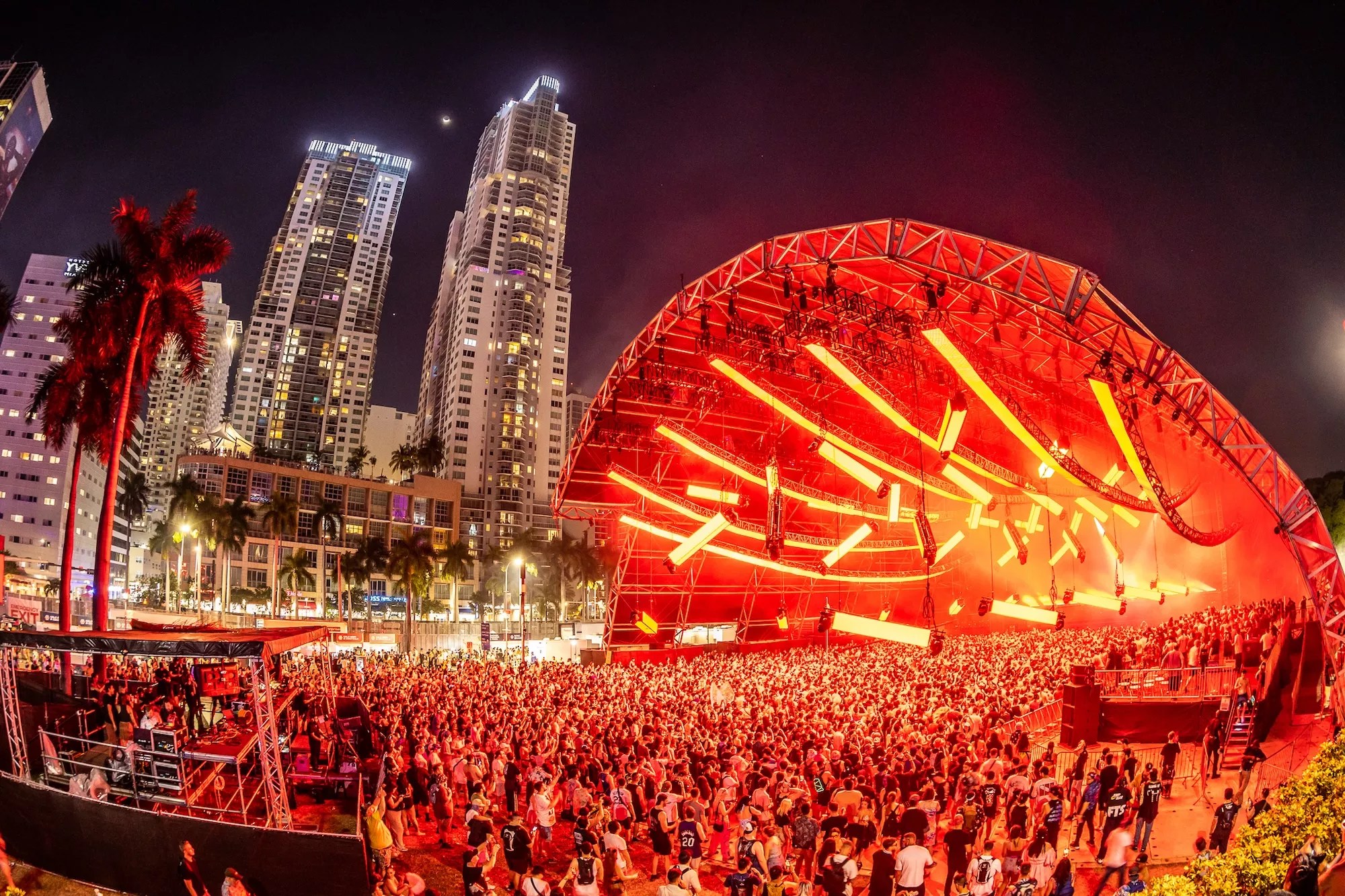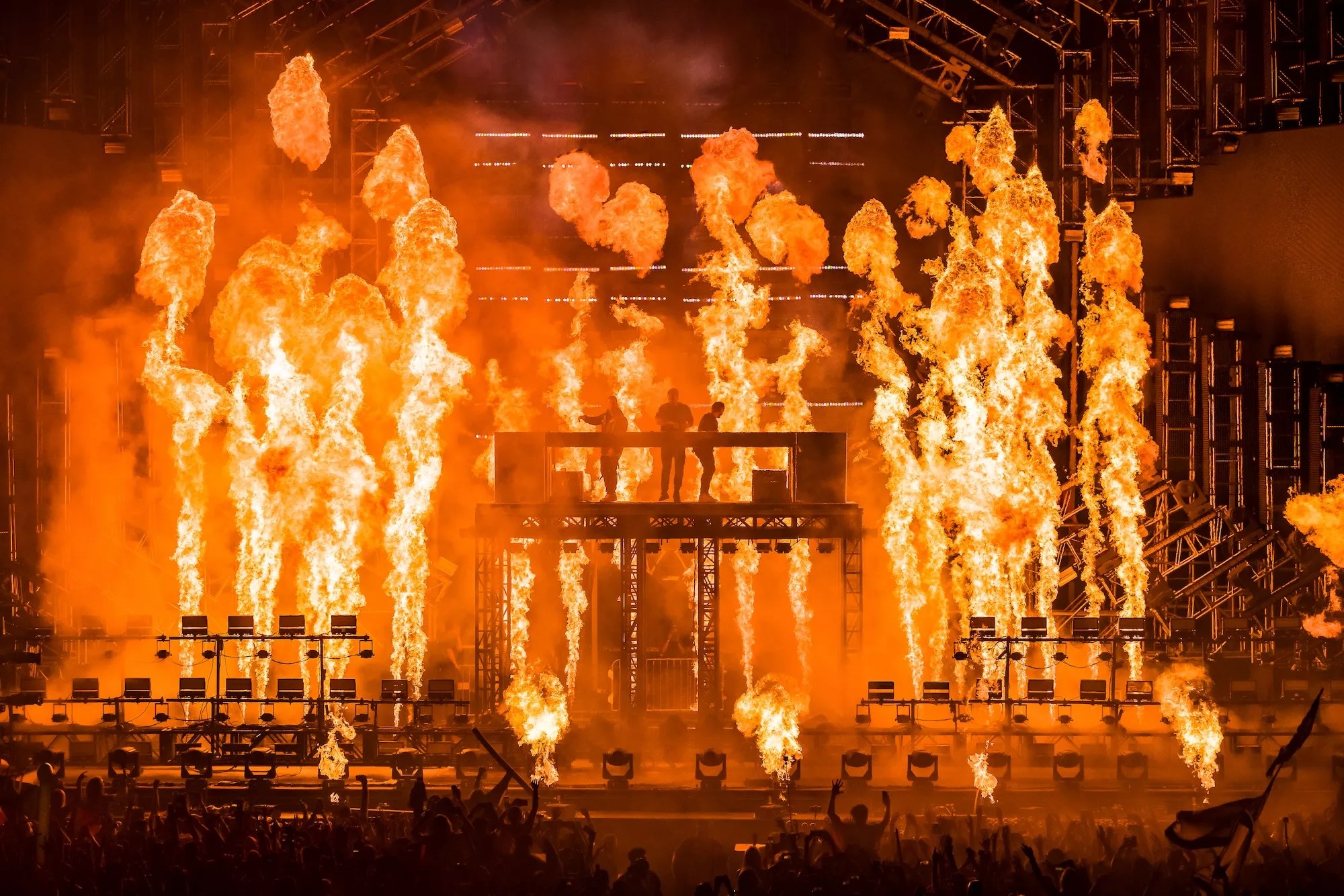
Photo by Alive Coverage

Audio By Carbonatix
For many, attending a music festival has become a rite of passage. You save up to buy tickets, sometimes a year in advance, often without knowing who will perform. You rally your crew and stock up on the last festival fashions and gear. If you have to travel, you might start looking for a hotel or Airbnb that doesn’t mind hosting six people in a room.
The music festival isn’t a new phenomenon – the modern iteration dates back to 18th-century England. However, the music festival we know today came together in the 1960s with the Monterey International Pop Festival in California, the Miami Pop Festival in Hallandale Beach, and, of course, Woodstock.
The late ’90s and early 2000s established many of the festivals that are still in existence today, including Ultra Music Festival, which started as a party on the sands of Miami Beach in 1999 before moving to downtown Miami in 2001. Most of these gatherings started independently, usually by a group of young people who wanted to bring together the bands they loved. But as they’ve grown, they’ve been swallowed by corporate behemoths and turned into somewhat homogenous experiences that are often indistinguishable from each other.
Coachella was founded by Goldenvoice in 1999 but was quickly absorbed by AEG in 2001 amid financial turmoil. Live Nation bought an undisclosed stake in Bonarroo in 2015, only to take over it completely by 2019. The Perry Farrell-founded Lollapalooza was a Gen Xers paradise in the ’90s when it was a touring festival, only to turn into a four-day behemoth at Chicago’s Grant Park under the control of Live Nation.
Even Miami’s music festivals haven’t been spared, with Live Nation having an undisclosed degree of control over events like Rolling Loud and III Points.
But one outlier remains: Ultra.

Ultra has found continued success thanks to its adaptability.
Photo by Alive Coverage
Twenty-five years after its founding, Ultra remains a homegrown festival that, despite having events in every continent except Antarctica, still feels like a quintessential Miami experience.
You can’t exactly blame once-independent music festivals for getting involved with corporate giants. Putting on a festival is an expensive endeavor that often leaves organizers in the red for the first few years.
Ultra’s beginnings were just as humble. It started as a one-day event on the sands of Miami Beach around the Collins Park area. “I remember the first year while scrambling to get the site ready to open doors, we didn’t realize until it got dark that no one put lights or power out front in the box office, and the entire area was pitch black,” Russell Faibisch, Ultra’s founder and CEO, remembers. “So police cars were moved and parked in front, on the sand, with their headlights on so that we could continue selling tickets after sunset.”
Prior to the festival, Faibisch attended Florida International University and started throwing parties around South Florida in 1997 under the banner of Ultra Productions. (In 2013, Faibisch previously told New Times that the name Ultra came from Depeche Mode’s 1997 album of the same name.) Faibisch started the festival to capitalize on all the dance-music talent flocking to Miami Beach every March to attend the Winter Music Conference industry gathering.
The gamble paid off, with Ultra moving to its current home in downtown Miami’s Bayfront Park in 2001 for its third edition. In subsequent years, it would turn into a massive three-day bacchanal of dance music, welcoming 55,000 attendees a day and producing events in 30 countries, all while keeping the organization local and without the help of any of the corporate event giants.
“Being independent allows us to grow organically, at the pace we feel is best for the long-term success of the brand.”
For Faisbisch, there is a lot of value in remaining independent. “Being independent allows us to grow organically, at the pace we feel is best for the long-term success of the brand. It also allows us to be creative and experiment with various components of our events and brands,” he says.
If there was a time when a corporate entity should have gobbled up Ultra, it was at the height of the EDM bubble in the early 2010s. During that time, it seemed like American audiences had finally caught up with the rest of the world in developing an appetite for dance music, and acts like Swedish House Mafia, Calvin Harris, the Chainsmokers, and Skrillex becoming the face of EDM and pop stars in their own right.
Looking to capitalize on EDM’s marketability, businessman Robert Sillerman founded SFX to acquire established dance music brands. During its short time, it took over brands like Beatport and the Belgian festival Tomorrowland. He also tried to acquire Miami Beach nightlife hospitality brand the Opium Group, but the deal fell through. At one point, SFX had a stake in David Grutman’s Miami Management Group, which operated venues like LIV at the Fontainebleau.
SFX famously imploded as EDM’s influence quickly waned, filing for Chapter 11 bankruptcy in 2016. Still, if any brand seemed poised to be acquired by SFX, it definitely was Ultra, one of the biggest dance music events in the U.S. and the kickoff to the music festival season. Faibisch says SFX approached Ultra, but it wasn’t really anything he or his partners took seriously. “We didn’t believe it would be in the best interest of the brand for the long term,” Faibisch adds.

Ultra’s organizers see a lot of value in remaining independent.
Photo by Alive Coverage
The festival has survived all these thanks to its adaptability and response to trends in electronic music that have gone into overdrive thanks to platforms like TikTok. Adam Russakoff, the festival’s director of business affairs, talent buyer, and executive producer, says dance music has changed a lot over the decades, and not only in the sounds coming out of the festival’s speakers. “I think accessibility has been the greatest change,” he says. “Gone are the days of having to rent a studio to produce. Anyone can make music from the comfort of their own home by purchasing software, gear, or instruments. For both DJs and producers, there are countless ways and methods to express yourself musically. The barriers to entry are far lower for this era’s electronic music artists, both economically and technologically.”
Ultra’s adaptability led the team to create its Resistance brand, which focuses on the more underground house and techno sounds ready to welcome the EDM-loving masses looking to graduate to more nuaced productions. And with techno’s popularity quickly rising stateside, Ultra is poised to be prepared whenever the genre eclipses EDM and tech-house.
Ultimately, Faibisch credits his team for the festival’s success nearly 25 years later. “The backbone of our success is the incredible team that makes up our organization. We handle just about everything in-house. Everyone’s unique skill set, passion, and dedication play an integral role in Ultra’s continued success.”
And for those crazy enough to start their own festival, Russakoff has words of advice. “I’d say identify your niche, understand your target audience, then program musically and content-wise to that audience. You must remember that the festival far exceeds yourself when it comes to your own personal taste and preferences, which might not necessarily encompass the taste and preferences of your audience – think fan first. At the same time, trust your ear and your gut. Don’t be afraid to take risks. If you understand your target market well, use your platform as a curator to introduce buzzing artists who you believe in your heart will resonate with your audience.”
Faibisch’s brother and the festival’s executive producer, Charles, adds, “My best advice for someone interested in starting a festival would be to stay true to your music genre. Take calculated risks, and grow from humble beginnings.”
But even with countless lineups over the year, the trio still has a small wishlist of acts they’d love to see grace Ultra’s stages. For Russakoff, it’s U2, and Charles points to the band who inspired the festival’s name, Depeche Mode.
“It’s hard to think of an act in our genre that hasn’t played Ultra,” Faibisch says. “But if I have to choose one, I’ll go with an act that has never played – one of the most important and iconic acts in electronic music history: Daft Punk.”
Ultra Music Festival 2024. Friday, March 22, through Sunday, March 24, at Bayfront Park, 301 Biscayne Blvd., Miami; ultramusicfestival.com. Sold out.
Check out New Times’ full listing of Miami Music Week 2024 events.